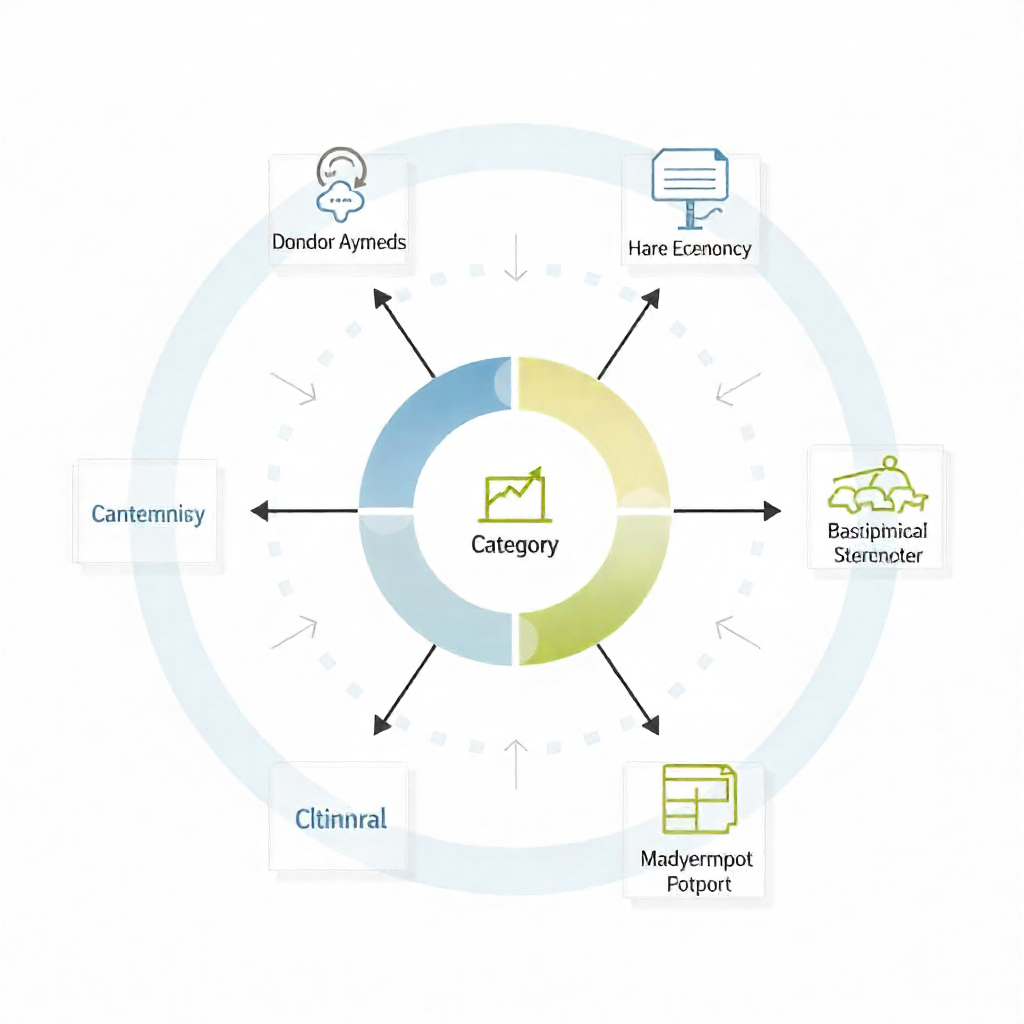QuickBooks Chart of Accounts Nigeria: The Ultimate Guide for Smart Business Owners (2025)
If your business in Nigeria uses QuickBooks (Online or Desktop), setting up a proper QuickBooks chart of accounts Nigeria is …

If your business in Nigeria uses QuickBooks (Online or Desktop), setting up a proper QuickBooks chart of accounts Nigeria is essential. Your Chart of Accounts (CoA) forms the backbone of your accounting system. It ensures transactions are recorded accurately, reports are generated correctly, and your company stays compliant with FIRS and state tax rules.
In this guide, you’ll learn how to build a clean, tax-friendly QuickBooks chart of accounts in Nigeria, see sample account categories with numbering codes, and discover best practices to keep your books efficient and audit-ready.
What Is the Chart of Accounts in QuickBooks?
A Chart of Accounts is the structured list of all the accounts your business uses to categorize financial transactions. These accounts are grouped into key categories such as:
-
Assets
-
Liabilities
-
Equity (Owner’s capital, retained earnings)
-
Revenue (Sales, other income)
-
Expenses (Cost of goods sold, overheads, etc.)
In QuickBooks, each of these categories includes sub-accounts and account codes that link directly to reports like the Profit & Loss statement and Balance Sheet. A properly customized QuickBooks chart of accounts in Nigeria helps ensure each transaction flows smoothly into your reports.
Why Proper Setup Matters for Nigerian Businesses
Setting up your QuickBooks chart of accounts correctly is more than just bookkeeping—it’s about financial clarity and tax compliance.
Here’s why it matters:
-
Tax laws: Nigerian tax regulations (VAT, Companies Income Tax, Withholding Tax) require clear separation of taxable and non-taxable items.
Nigerian tax laws like VAT, Companies Income Tax, and Withholding Tax require proper categorization in your QuickBooks chart of accounts Nigeria.
For the latest changes and rates, read our updated guide on VAT rate in Nigeria (2025)
-
Regulatory filings: The FIRS and State tax authorities expect proper categorization of accounts.
-
Local context: Nigerian businesses often deal with forex, import duties, and exchange rate differences that must be reflected correctly.
-
Audits & investors: A clean CoA simplifies financial reviews and builds investor confidence.
Many entrepreneurs overlook the importance of customizing their QuickBooks chart of accounts in Nigeria, which can cause major issues during audits or tax filing.
How to Set Up a QuickBooks Chart of Accounts in Nigeria
Follow these five simple steps to get your CoA right the first time.
1. Decide on Account Structure and Numbering
Use a numbering system to group similar account types logically. For example:
| Category | Number Range |
|---|---|
| Assets | 1000–1999 |
| Liabilities | 2000–2999 |
| Equity | 3000–3999 |
| Revenue | 4000–4999 |
| Expenses | 5000–6999 |
Sub-accounts help add detail. For example, under Expenses, include “Office Supplies,” “Utilities,” and “Transport.”
Before creating your QuickBooks chart of accounts , plan this numbering system carefully so reporting stays consistent.
2. Include Tax and Regulatory Accounts
To stay compliant, make sure your QuickBooks chart of accounts includes accounts for local taxes:
-
VAT Payable / VAT Receivable
-
Withholding Tax Expense / Payable
-
Import Duties / Excise Tax
-
Foreign Exchange Gain or Loss
These ensure accurate calculation and remittance of taxes, reducing manual errors and audit risks.
3. Enter Opening Balances Correctly
When migrating from manual books or another accounting system, enter your opening balances carefully.
Check that Assets = Liabilities + Equity to maintain a balanced QuickBooks chart of account.
4. Clean Up Unnecessary Accounts
QuickBooks comes with default accounts that may not fit Nigerian needs. Delete or deactivate irrelevant ones to reduce clutter. Use sub-accounts instead of creating too many top-level categories.
Keeping your QuickBooks chart of accounts simple and structured helps avoid confusion during reconciliations or audits.
5. Review and Update Regularly
Your business evolves, and so should your CoA. Review your QuickBooks chart of accounts in Nigeria at least once a year. Merge redundant accounts, add new ones, and ensure naming consistency (e.g., “Office Rent” instead of “Rent Lagos Office”).
Sample QuickBooks Chart of Accounts Nigeria Template
Below is a sample QuickBooks chart of accounts structure for small to medium-sized businesses. You can modify it for your industry.
| Code | Account Name | Type | Notes |
|---|---|---|---|
| 1000 | Cash on Hand | Current Asset | Petty cash |
| 1010 | Bank Accounts | Current Asset | Main and foreign bank accounts |
| 1100 | Accounts Receivable | Current Asset | Customer balances |
| 1300 | Fixed Assets | Fixed Asset | Equipment, furniture |
| 2000 | Accounts Payable | Current Liability | Supplier balances |
| 2100 | Loans & Overdrafts | Non-current Liability | Bank or investor loans |
| 2200 | Withholding Tax Payable | Current Liability | Taxes deducted but unremitted |
| 3000 | Share Capital | Equity | Owner’s capital |
| 3100 | Retained Earnings | Equity | Accumulated profit/loss |
| 4000 | Sales Revenue | Revenue | Core business income |
| 4100 | Other Income | Revenue | Interest, forex gains |
| 5000 | Cost of Goods Sold | Expense | Direct costs |
| 5100 | Salaries & Wages | Expense | Payroll expenses |
| 5200 | Rent Expense | Expense | Office or store rent |
| 5300 | Utilities | Expense | Power, internet, water |
| 5400 | Marketing | Expense | Advertising, promotions |
Adjust this QuickBooks chart of accounts Nigeria template to fit your company’s unique structure and reporting needs.
Common Mistakes to Avoid
-
Creating too many accounts for small items
-
Forgetting tax accounts like VAT or WHT
-
Mixing business and personal transactions
-
Using unclear or inconsistent naming
-
Ignoring exchange rate or foreign currency differences
Avoiding these mistakes ensures your QuickBooks chart of accounts remains simple, accurate, and easy to audit.
Best Practices for QuickBooks Chart of Accounts in Nigeria
-
Enable account numbering for better organization
-
Maintain consistent naming conventions
-
Use sub-accounts for detailed tracking
-
Train your team on proper account usage
-
Document your CoA for easy onboarding
-
Review periodically for redundancy
Regular maintenance keeps your QuickBooks chart of accounts Nigeria accurate and scalable as your business grows.
How Zaccheus Helps Automate and Optimize Your Chart of Accounts
Zaccheus AI CFO simplifies financial setup and maintenance. It integrates seamlessly with your accounting tools to:
-
Audit and clean up your existing QuickBooks chart of accounts Nigeria
-
Auto-categorize transactions using AI
-
Map transactions to Nigerian tax categories (VAT, WHT)
-
Remind you of tax filing deadlines
-
Generate accurate financial and compliance reports instantly
Zaccheus helps Nigerian entrepreneurs focus on growth, not spreadsheets.
👉 Try Zaccheus free today at usezaccheus.com.
Frequently Asked Questions (FAQ)
Q1. Does account numbering matter in Nigerian QuickBooks setups?
Yes. Numbering helps group accounts logically, simplify reporting, and improve audit readiness.
Q2. Can I use the default QuickBooks CoA or must I customize it for Nigeria?
You can start with QuickBooks defaults but must customize for Nigeria by adding VAT and WHT accounts and removing irrelevant ones.
Q3. How many sub-accounts should I have?
Use one or two levels only. Too many sub-accounts make your system harder to navigate.
Q4. How do I handle foreign currency accounts?
Create separate accounts for USD, GBP, or EUR and include an “Exchange Gain/Loss” account.
Q5. How often should I review my Chart of Accounts?
At least annually. Archive or merge unused accounts and keep naming consistent.
Conclusion
A well-structured QuickBooks chart of accounts in Nigeria makes your bookkeeping cleaner, improves financial visibility, and ensures compliance with Nigerian tax authorities. By organizing your CoA logically and reviewing it regularly, you’ll save hours of manual cleanup and avoid costly errors, also learn how to reduce payment gateway fees in Nigeria to optimize your cash flow and cost management.
Ready to simplify your accounting setup?
Start using Zaccheus AI CFO to clean, organize, and automate your QuickBooks chart of accounts Nigeria today.

